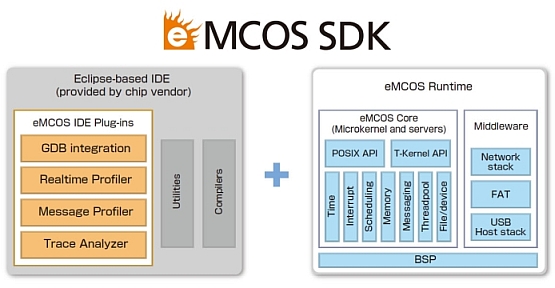eSOL Launches eMCOS SDK for Many-core Processors
Permits Quick Evaluation of Many-core Processors with Linux and TRON Software Assets

Tokyo, Japan. February 6, 2015 –eSOL, a leading developer of real-time embedded software solutions, today announced that they have launched the eSOL eMCOS SDK, a software development kit for many-core processors. The eMCOS SDK consists of the eSOL eMCOS many-core real-time operating system (RTOS), its integrated middleware components that offer network, file, and USB services, and the eSOL eMCOS IDE Plug-in development and analysis tools. Developers can immediately execute and evaluate their Linux and TRON software assets on a many-core processor, since eMCOS supports POSIX and T-Kernel APIs and comes with standard driver stacks. The eMCOS SDK initially supports the 36-core TILE-Gx8036™ processor.
eSOL will demonstrate the eMCOS SDK running on the TILE-Gx8036 in its booth, no.157 in Hall 4, at the Embedded World Exhibition & Conference 2015, February 24-26, in Nuremberg, Germany.
A many-core processor with tens or hundreds of cores boasts overwhelming computing capability and low power consumption. The many-core technology is best suited for intelligent connected embedded systems requiring advanced image processing and recognition, and hard real-time processing of huge amounts of data. Many-core processors are being adapted to more and more applications, including autonomous driving technology, robots, computer vision, and medical devices. However, we have a significant challenge for software development for many-core processors. Conventional RTOSes for single-core and multi-core processors will not work on many-core processors because of the difference in hardware principals and its architectures.
eSOL developed eMCOS, a totally different RTOS from existing RTOSes, to address such a challenge. One of the big differences is eMCOS’s distributed microkernel architecture. A microkernel is allocated to each individual core to offer basic services, including inter-core message passing, local thread scheduling, and thread management. Advanced OS services, including device drivers plus file system and network services, are provided by distributed server threads running under microkernels on multiple cores within a many-core processor. This fundamental architecture allows a reduction in the sharing of OS data among multiple cores, and offers scalability on any many-core processor without a cache coherency mechanism. Moreover, eSOL’s patent-pending eMCOS Semi-priority-based Scheduling™ algorithm ensures fast real-time responses as well as the high throughput and scalability that are expected from many-core processors. Application developers do not need to pay attention to which cores execute their program, as eMCOS employs the same programming model as that of other multi-core RTOSes, including eSOL’s eT-Kernel Multi-Core Edition. eMCOS OS APIs are offered with the familiar C function interface. eMCOS does not require developers to recognize message-passing behavior that is conducted internally and automatically within APIs. eMCOS supports POSIX and T-Kernel APIs.
eSOL also developed the eSOL eMCOS IDE Plug-in tools for application development, which work as plug-ins for the Eclipse-based IDEs provided by many-core semiconductor manufacturers. The eMCOS IDE plug-ins include a debugger to control execution of programs on many-core processors allowing opening a debug window for each thread, a sampling-based Realtime Profiler to analyze and display system performance, and a Message Profiler to analyze message communication behaviors.
In addition to research and development of our own products, eSOL actively works with both academic institutions plus domestic and international industry groups as a leading company promoting many-core technology. eSOL chairs the Software-Hardware Interface for the Multi-Many-Core (SHIM) working group in the Multicore Association® (MCA).
“eMCOS is designed and implemented to allow a smooth transition from existing development environments using Linux and TRON software assets, and a familiar programming model,” said Masaki Gondo, Software CTO and GM of Technology at eSOL. “Developers can easily evaluate many-core processors and eMCOS by use of the newly released eMCOS SDK. As a leading company in the many-core technology area, eSOL will continue to support developers of multi-core and many-core software.”
>> For Reference
About eSOL Co., Ltd.
eSOL is a leading embedded software developer that enables customers to accelerate development of applications based on high-end embedded processors including multi-core. Our advanced, scalable, multi-profiled real-time operating systems are tightly integrated with development tools and middleware components to create flexible development platforms used by OEMs and ODMs worldwide in competitive vertical markets such as automotive, consumer electronics, industrial and medical equipment and aerospace. Founded in 1975, eSOL is based in Tokyo, Japan.
For more information, please visit www.esol.com
###

